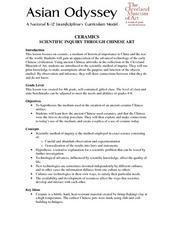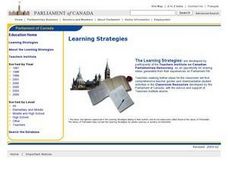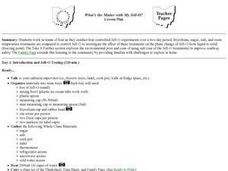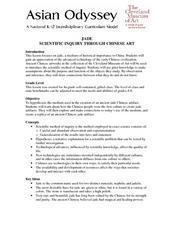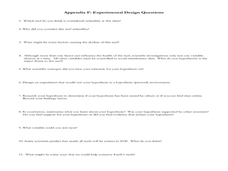Curated OER
Paper: Scientific Inquiry Through Chinese Art
Students create replicas of Chinese hanging scrolls in an attempt to understand the technology behind the creation and use of paper in Ancient China. This three-day lesson includes enrichment ideas.
Curated OER
Ceramics Scientific Inquiry Through Chinese Art
Fourth graders explore, examine and study ceramics, a medium of historical importance to China. They review the advanced technology of the early Chinese civilization and are introduced to the scientific method of inquiry and make...
Curated OER
Selecting Soil For a Sports Field
In this science worksheet, students take part in a laboratory exploration looking at different types of soil. The soil is evaluated in order to fill the role of becoming a sports field.
Curated OER
Interpreting Data
In this interpreting data worksheet, students solve and complete 4 different types of problems using different data types. First, they collect raw data from a paragraph shown. Then, students identify the examples of two different types...
Curated OER
Outrageous Ooze
Students examine states of matter. In this solids and liquids lesson, students conduct a scientific investigation that requires them to make ooze and record their observations pertaining to it.
Curated OER
Evolution: The Great Debate
Students discover how research and questioning are things that must be done in order to form a valid opinion. In this critical thinking lesson students answer questions and provide evidence to support their argument.
Curated OER
How Does Flowing Water Shape a Planet's Surface?
Students investigate how flowing water influence landforms. In this earth science lesson, students observe water behavior as it flows from the stream table at various inclinations. They discuss whether water shaped Mars landforms or not.
Curated OER
Make Sense of Nature
Students participate in this program that heightens their awareness and curiosity of nature as well as their sense of adventure and exploring new surroundings. They identify and choose an object from nature after exploring it with other...
Curated OER
Temperature and Brine Shrimp Eggs
Students determine the optimal temperature at which brine shrimp eggs hatch and develop. They evaluate the changes, if any, which occur in a brine shrimp culture at various temperatures.
Curated OER
Can Bacteria Arise from Non-living Things?
Fourth graders, in groups, determine whether bacteria arises from non-living things,
Curated OER
Youth Engagement in Politics and Government
Students gain knowledge of government representatives, political parties, and the democratic process.
Curated OER
Yeast Cells and Their Environment
Middle schoolers create their own experiment in which they have yeast cells growing in liquid environments. They examine the relationship between humans and microorganisms. They also practice using the scientific method.
Curated OER
What's the Matter with My Jell-o?
Young scholars work in teams of four as they conduct four controlled Jell-O experiments over a two-day period. The Family Page extends this learning to the community by providing families with challenges to explore at home.
Curated OER
Find the Washer
Students examine a closed box with wires and try to guess where the washer is. They experiment by pulling out wires to determine the location of the washer. They complete discussion questions to end the lesson.
Curated OER
Termite Lab
Students examine insect behavior in a lab activity. Students explore the idea of chemical specificity and the reactions of termites to a chemical found in their trail pheromone. Students watch a demonstration with termites before...
Curated OER
Archaeobotany
Students study pictures of seeds and the conditions in which they grow during their study of archaeobotany. They infer ancient plant use by looking at archaeobotanical samples. They determine the change of plant use by interpreting a...
Curated OER
Scientific Inquiry
Students make inferences about what activities occur at different places in school. They form a hypothesis as to how space is used. They simulate how archeaologists explore past people by designing and conducting a research project.
Curated OER
Determining the Proper Cement: Water Ratio for Quality Concrete
High schoolers examine concrete samples and guess their strength. They determine the correlation between concrete strength and the cement to water ratio that was used in making each sample. They make a quality concrete based on their...
Curated OER
Silk: Scientific Inquiry Through Chinese Art
Students investigate the many uses of silk in Chinese society through in-class experiments, group projects, and hands-on learning in this cross-curricular instructional activity. There are four main activities included in this...
Curated OER
Jade: Scientific Inquiry Through Chinese Art
Young scholars discover the uses of Jade in Chinese art and society through in-class discussions, group projects, and internet research. Additional enrichment activities are included.
Curated OER
Marine Biology Lesson on Understanding the Dynamics of the Reef Ecosystem
Students compare data from a healty and unhealthy reef ecosystem. In this marine biology lesson, students identify which sample is stressed. They formulate a hypothesis on why the reef is stressed and support their hypothesis with proven...



